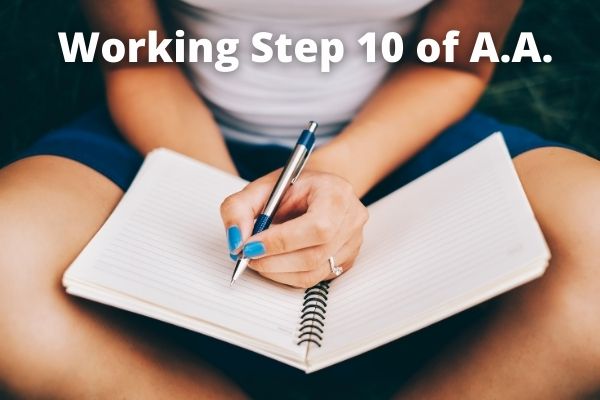Continued to take personal inventory and when we were wrong promptly admitted it.
We first took inventory of ourselves in Step 4, but self-improvement isn’t just a one-and-done deal. Working Step 10 pushes us to do this on a daily basis. Remember: Recovery is a life-long journey that continues long after you have worked all twelve steps of Alcoholics Anonymous. It is an ongoing process where, in order to grow, you must continuously shed your old self. The only way this can happen is through constant and continuous self-reflection. But this still begs the question: how does continued personal inventory help you stay sober?
Why Step 10 Matters
Step 10 is significant in that it’s the first one concerned with future behavior rather than analyzing past actions. It encourages ongoing personal inventory and self-assessment in order to continue the progress you’ve made thus far. If this step were to be summed up in a single word it would be ‘maintenance’. However, making self-examination a daily habit isn’t just for the benefit of practicing mindfulness. This works like a daily spot check. It can help you identify specific points in your day where you may have struggled (or excelled) in applying the principles of AA teachings.
To put it simply, step 10 is all about control–specifically, control over one’s reactions. Think back to how your alcoholism habit started. You may have turned to drink because of a reaction to some sort of stressor (a bad day at work, an argument with a loved one, feeling depressed)–this was a lack of control over your emotional outlets. Then, when you drank, you did so in such excess that it interfered with the foundations of your daily life–another display of a lack of control. Fortunately, this is an ability that can be developed and improved upon. Steps 1-9 gave you the foundation to do so, now it’s up to you to put it into practice.
The Importance of Self-Restraint
One of the highlights in the Step 10 text is an emphasis on self-restraint- but what is it exactly? Self-restraint is not:
- Repressing negative emotions (like anger, jealousy, frustration, or sadness)
- Feeling bad or guilty about having negative emotions
- Denial of your feelings
- Removing yourself from situations that might incur these feelings
Self-restraint is the cognitive ability to regulate your emotions, thoughts, and behaviors regardless of the situation. Just as with any other type of skill, it can be learned, but it’s not something that simply develops overnight. Exercising self-restraint in your smaller daily interactions will better prepare you when bigger issues arise–major stressors that might otherwise tempt you to relapse. You won’t always have control over where you’re at, who you’re around, or what happens to you, which is why earning (and practicing) self-restraint is key to maintaining sobriety.
Tips For Working Step 10
Being mindful and continuously rehashing your immediate behavior can give you valuable insight into your triggers, recognizing your response patterns, and recognizing the consequences of your responses. This means taking a moment to stop and analyze whenever you find yourself in an emotionally-charged situation:
- How does this make me feel?
- Why do I feel this way?
- What would happen if I gave into my instinctual reaction and would it fix/improve the situation?
The other half of this is looking at how you did end up responding to a situation. Did you do it in a way that you would look back on and feel proud of? If not, do you think that the person or situation deserved the reaction you gave? Part of self-restraint means always striving to hold yourself to a higher standard even when someone else doesn’t (see: Step 9).
Try to practice this self-reflection both in the moment and at the end of each day. Over time, this skill will become second nature, giving you ultimate control over yourself.
